As pet owners, ensuring the well-being of our feline companions is a responsibility we hold dear. When it comes to the interaction between cats and roses, a common concern arises regarding the potential risks posed by these fragrant blooms.
Understanding the implications of floral toxicity on our beloved kitties is crucial for maintaining a safe environment within our homes. By exploring the intricate relationship between roses and cats, we can uncover essential insights to protect our furry friends from harm.
Let's navigate the realm of floral safety to uncover how to safeguard our kitties around these alluring bouquets.
Key Takeaways
- Roses are not poisonous to cats but can cause gastrointestinal upset and mouth trauma.
- Signs of mouth trauma include visible wounds and excessive drooling in cats.
- Consult a vet if signs of mouth trauma are observed after cat exposure to roses.
- Keep toxic flowers out of reach, monitor cats around flowers, and provide safe alternatives.
Understanding Roses and Cats Safety
In considering the safety of roses for cats, it is essential to recognize that while roses are not generally considered poisonous to felines, precautions should still be taken due to potential risks associated with ingestion and physical harm.
Although these beautiful blooms may not pose a direct toxicity threat, cats that nibble on roses can experience gastrointestinal issues like vomiting and diarrhea. Furthermore, the thorny stems of roses can cause mouth trauma if chewed, leading to visible wounds or excessive drooling.
If such signs are observed, it is advisable to seek veterinary assistance promptly. Understanding these risks can help ensure the well-being of your feline friend when they are in proximity to roses.
Risks of Ingesting Roses for Cats
Considering the potential consequences of cats ingesting roses, it is crucial to understand the specific risks associated with this common floral exposure.
While roses themselves are not considered poisonous to cats, ingestion can result in gastrointestinal upset such as vomiting and diarrhea. Additionally, the thorny stems of roses pose a risk of mouth trauma if chewed by cats. This could lead to injuries in the mouth, tongue, or throat.
It's essential to monitor cats around roses and seek veterinary care if any signs of mouth trauma or unusual behavior are observed. Preventing access to roses and providing safe alternatives for cats to interact with can help mitigate the risks associated with ingesting these beautiful but potentially harmful flowers.
Identifying Signs of Mouth Trauma
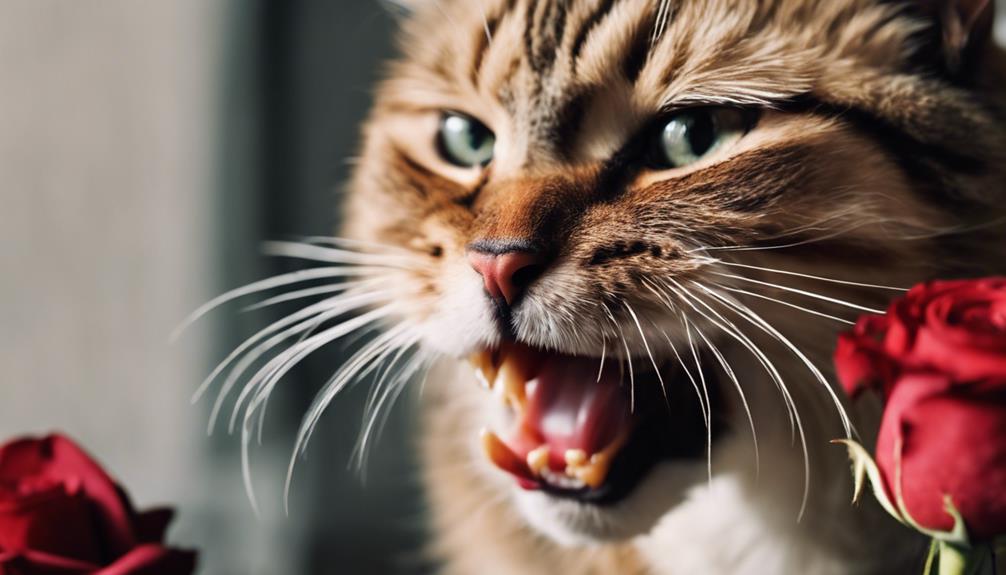
Detecting signs of mouth trauma in cats exposed to roses is crucial for ensuring early intervention and proper care. It's essential to closely monitor your feline friend for any indications of mouth injuries after interacting with roses.
Here are some key signs to watch out for:
- Visible wounds or cuts inside the mouth.
- Excessive drooling or difficulty eating.
- Pawing at the mouth or showing signs of discomfort.
If you notice any of these symptoms, it's important to seek veterinary attention promptly to address the mouth trauma effectively. Early detection and treatment can help prevent further complications and ensure your cat's well-being.
Seeking Vet Help for Cats
Upon observing any signs of mouth trauma in your cat after exposure to roses, prompt veterinary assistance is essential to ensure proper care and prevent further complications.
Cats may experience pain, bleeding, or difficulty eating if they have mouth injuries from rose thorns. Seeking professional help ensures a thorough examination to assess the extent of the trauma and determine the necessary treatment.
Veterinarians can provide pain relief, clean and treat any wounds, and recommend appropriate steps for your cat's recovery. Delaying veterinary care can lead to infections or other complications, so it's crucial to act promptly.
Your cat's well-being is the top priority, and veterinarians are equipped to offer the best possible care in such situations.
Handling Large Ingestions Properly
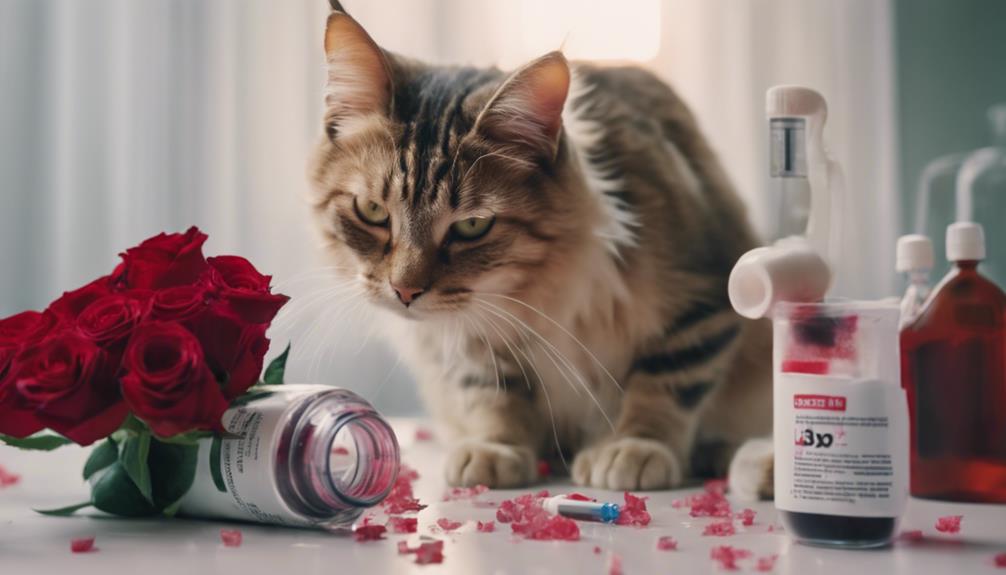
In cases of significant ingestion of roses by cats, immediate veterinary intervention is crucial to address any potential risks and provide appropriate care. It is essential to remember that cats' bodies can react differently to ingested substances, and what may seem like a harmless flower could lead to severe complications.
When faced with large ingestions of roses by your feline friend, consider the following steps:
- Contact your veterinarian or emergency pet helpline promptly.
- Avoid inducing vomiting without professional guidance.
- Be prepared to provide details about the quantity and time of ingestion for effective treatment.
Taking swift action and seeking professional help can make a significant difference in ensuring your cat's well-being after a significant ingestion event.
Knowing Toxic Flowers for Cats
When considering the safety of cats around flowers, it is essential to be aware of toxic varieties, such as those that can pose risks to feline health like lilies and flowers with 'rose' in their name. Some flowers with 'rose' in their name are toxic to cats and should be avoided to prevent any potential harm. Here is a table outlining some toxic flowers for cats:
| Toxic Flowers | Potential Risks for Cats |
|---|---|
| Lilies | Acute kidney failure |
| Christmas Rose | Toxic effects |
| Primrose | Poisoning symptoms |
| Pesticide Chemicals | Ingestion risks |
Being mindful of these flowers can help you create a safer environment for your beloved feline friend.
Avoiding Dangerous Flower Names
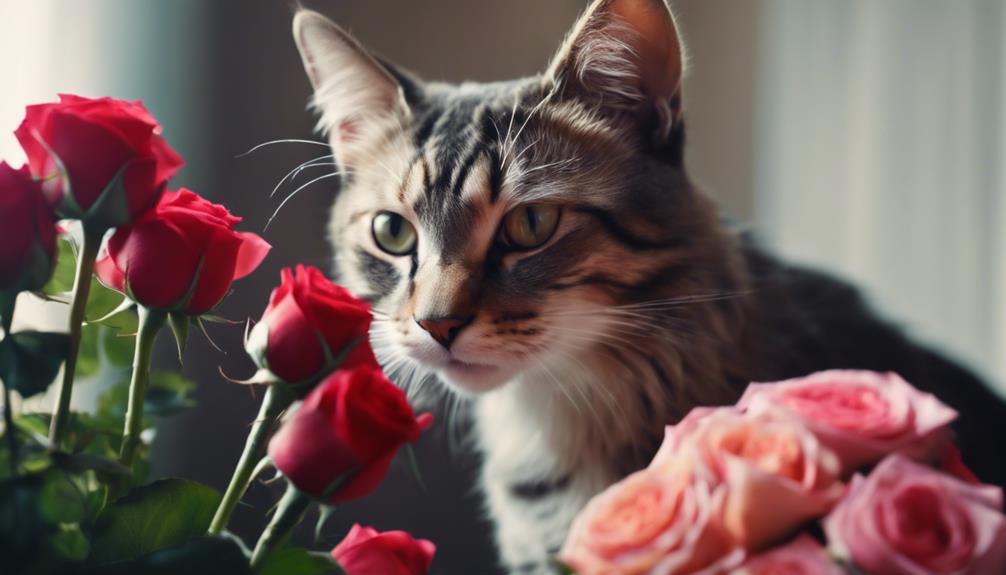
Among the precautions for ensuring the safety of cats around flowers, it is crucial to be mindful of potentially harmful flower names to protect your feline companion from any risks.
Some dangerous flower names to avoid include Christmas Rose and Primrose.
Being aware of these names can help prevent accidental exposure.
Consider labeling flowers or researching their names before bringing them into your home.
Being Cautious With Chemicals
To safeguard your cat's well-being around flowers, it is vital to exercise caution when it comes to potential exposure to chemicals present in floral arrangements. Chemicals like pesticides and fertilizers used on flowers can pose serious risks if ingested by your feline friend. These substances may lead to symptoms ranging from mild gastrointestinal upset to more severe toxicity. Here is a quick guide to some common chemicals found in floral arrangements:
| Chemical Type | Potential Risks |
|---|---|
| Pesticides | Gastrointestinal upset, toxicity |
| Fertilizers | Ingestion may lead to poisoning |
Exploring Non-Toxic Flower Options
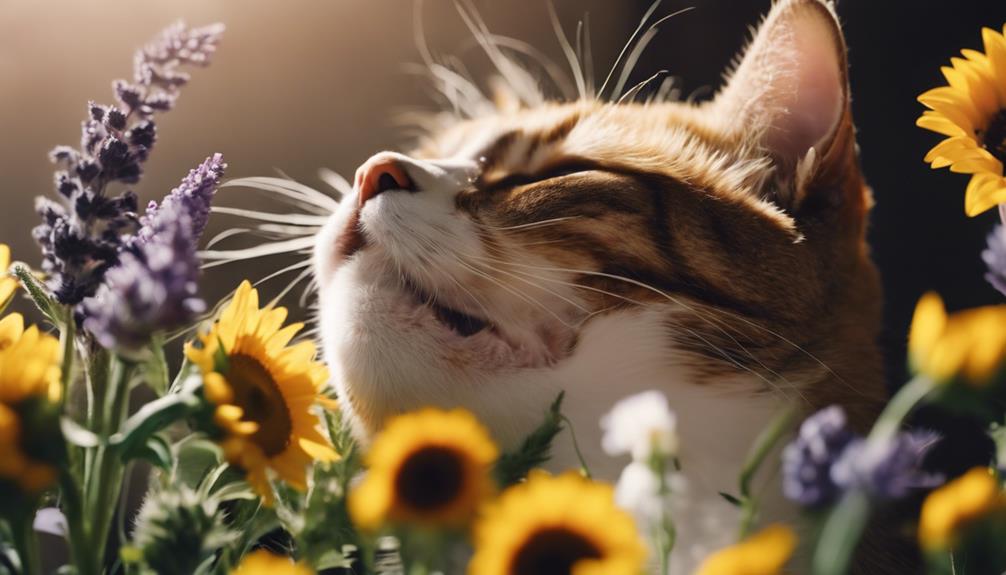
To ensure the safety of your feline companion around floral arrangements, it is essential to consider non-toxic flower options that pose no harm if ingested. When selecting flowers for your home, keep your cat's well-being in mind by choosing from a variety of safe options such as:
- Asters
- Orchids
- Zinnias
These non-toxic blooms not only add beauty to your living space but also provide peace of mind knowing that your curious cat can explore without the risk of harmful effects. By incorporating these feline-friendly flowers into your decor, you can create a safe and harmonious environment for both you and your beloved pet.
Providing Safe Alternatives for Cats
When considering the safety and well-being of cats around flowers, it is essential to provide them with safe alternatives for interaction and exploration. Cats are naturally curious creatures and may be drawn to plants and flowers, so offering them safe alternatives can help prevent them from potentially harmful exposure.
Indoor, chemical-free grass can be a great option as a safe snack for cats, satisfying their urge to chew on greenery without the risk of toxicity. Additionally, safe flowers like Asters, Orchids, and Zinnias can be introduced into the environment for your feline friend to enjoy without the worry of adverse effects.
Implementing General Safety Practices
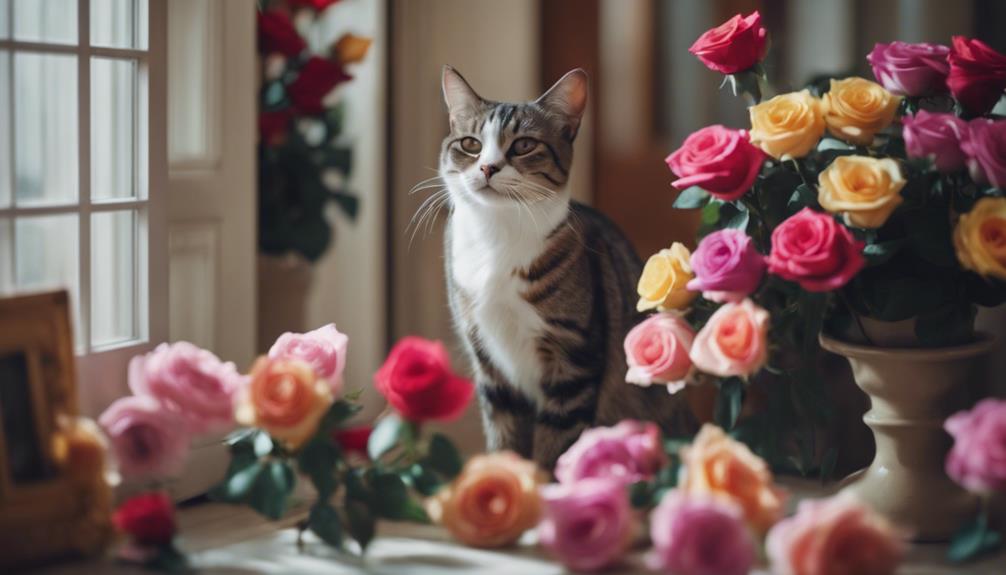
Implementing proactive safety measures ensures the well-being of cats in floral environments, mitigating potential risks associated with flower exposure. To keep your kitty safe around bouquets, consider the following:
- Place toxic flowers out of reach to prevent accidental ingestion.
- Supervise your cat around flowers to intervene if necessary.
- Offer safe alternatives like cat grass for chewing to deter interest in potentially harmful blooms.
Frequently Asked Questions
Can Cats Safely Ingest Roses Without Any Negative Consequences?
Cats can safely ingest roses without severe consequences, but may experience gastrointestinal upset or mouth trauma from thorny stems. Monitor for signs of distress, like vomiting or drooling, and consult a vet if concerns arise.
Are There Any Specific Types of Roses That Are More Harmful to Cats Than Others?
Certain types of roses are not inherently more harmful to cats than others. However, precautions should be taken with any rose variety due to potential risks of mouth trauma from thorny stems or gastrointestinal upset from ingestion.
How Can One Differentiate Between Typical Gastrointestinal Upset and More Serious Signs of Poisoning in Cats After Ingesting Roses?
Differentiating between typical gastrointestinal upset and serious poisoning signs in cats after ingesting roses involves monitoring for persistent symptoms such as lethargy, disorientation, tremors, or seizures. Prompt vet intervention is crucial for accurate diagnosis and treatment.
Are There Any Home Remedies or Treatments That Can Be Used to Induce Vomiting in Cats Who Have Ingested a Large Amount of Roses?
For cats who have ingested a large amount of roses, it is crucial to consult a veterinarian for professional help in inducing vomiting. There are no safe home remedies for inducing vomiting in cats, emphasizing the importance of veterinary care in such instances.
Are There Any Specific Precautions That Should Be Taken When Displaying Roses in a Household With Cats to Ensure Their Safety?
To ensure cats' safety around roses, keep them out of reach to prevent ingestion and potential mouth trauma from thorny stems. Monitor for signs of discomfort like vomiting and diarrhea. Consult a vet for any concerning symptoms.
Conclusion
In conclusion, it is crucial for cat owners to be aware of the potential risks roses may pose to their feline companions.
By understanding the dangers of ingestion and physical contact with roses, implementing safety measures, and exploring non-toxic flower options, pet owners can create a secure environment for their cats.
It is essential to prioritize the safety and well-being of our furry friends when it comes to floral arrangements in our homes.




